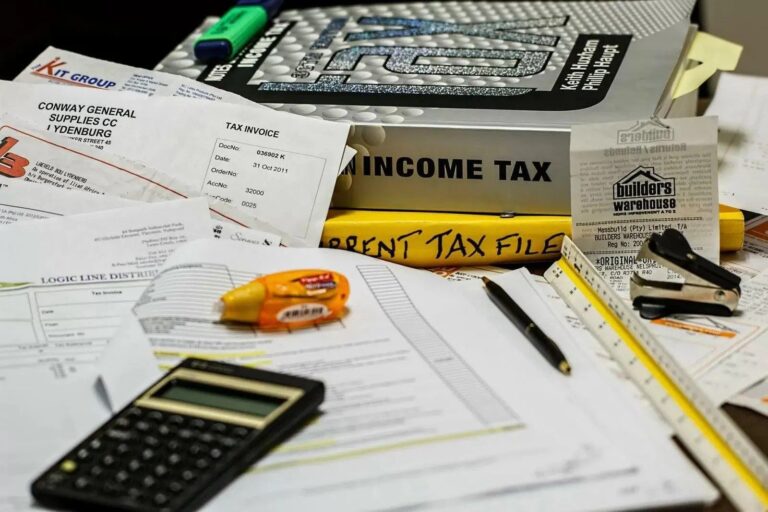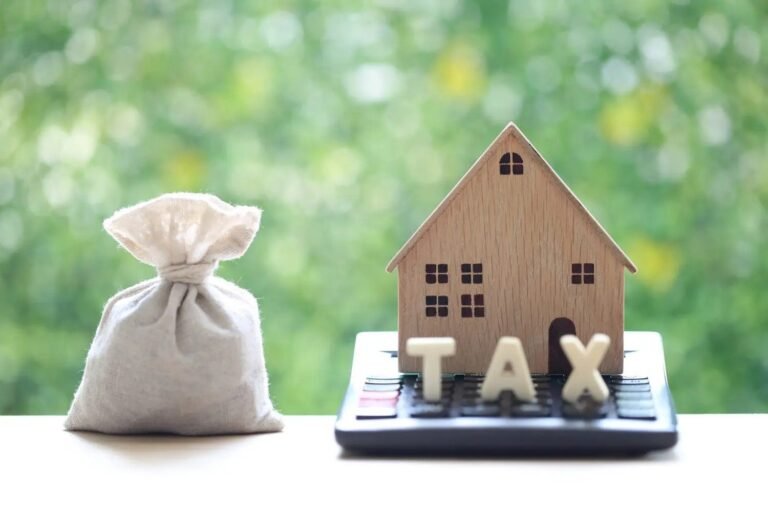You must pay taxes on rental income whether you rent a property as an individual or a business. As a landlord, you must pay income tax on your rental property profits. Your profit is your rental income minus any expenses or allowances.
Before 2017, the process involved deducting all property costs, including mortgage interest, from rental income received or due until April 5. This calculation determined whether you made or lost money. Profits would be added to other income in the same tax year, and you would pay tax at your marginal rate. In the event of a loss, you would offset it against future rental profits.
However, rental income earned by a corporate entity is subject to corporation tax. Depending on profits, corporation tax rates vary.
In this article, we’ll look at how different scenarios affect how rental income is taxed.
Working out The Tax on Rental Income for an Individual Landlord
Rental income is taxed at the rate applicable to your Income Tax band. There are many potential sources of income, and each has its own tax treatment. To determine the correct amount of tax to pay, it is essential to be precise when calculating your income.
Your rental income is subject to the same Income Tax rates and thresholds that apply to your personal income. However, when combined with other sources of income, your net rental income could cause you to fall into a higher tax bracket than usual.
The Income tax rates are:
|
For 2022/23 |
For 2023/24 |
Tax |
|---|---|---|
|
First £12,570 (Personal allowance) |
First £12,570 (Personal allowance) |
0% |
|
£12,571 to £50,270 |
£12,571 to £50,270 |
20% |
|
£50,271 to £150,000 |
£50,271 to £125,140 |
40% |
|
Above £150,000 |
Above £125,140 |
45% |
Interest relief restriction (Section 24)
A residential landlord must pay tax on their net rental income until the 2016/17 tax year. The net rental profit is determined after deducting allowable property expenses and mortgage interest from the gross rent.
However, you are no longer able to deduct mortgage interest as an expense as of the tax year 2020/21 due to the interest rate relief restriction that was phased in gradually beginning in the 2016/17 tax year. Rather, your tax bill is reduced by 20% in the form of a tax credit.
A comprehensive guide on ” Section 24’s ” impact on landlords. Learn how tax relief restrictions could change your tax situation and prepare for potential future interest rate increases.
Let us understand this with an example:
David has the following income for the tax year 2023/24:
|
Rental income from furnished property |
£19,600 |
|
In relation to the rental income, following expense was incurred. |
|
|
Interest on mortgage |
£3,600 |
|
Agent Fees |
£1,040 |
|
Repair and Maintenance |
£600 |
|
Utility bills |
£300 |
|
Fitted Kitchen Unit |
£1,000 |
The tax liability for David is computed as below:
|
Rent Received |
£19,600 |
|
Less: Deductible Expenses |
|
|
Agent Fees |
£1,040 |
|
Repair and Maintenance |
£600 |
|
Utility bills |
£300 |
|
Fitted Kitchen Unit |
£1,000 |
|
Net Rental Profit |
£16,660 |
|
Less: Personal allowance |
£12,570 |
|
Taxable income |
£4,090 |
|
Tax: £4,090 x 20% |
£818 |
|
Less: Tax reduction of interest (£3,600 x 20%) |
£720 |
|
Tax liability |
£98 |
Reporting of Tax on Rental Income UK to HMRC
Landlords must report rental income to HMRC. Self-Assessment tax returns require landlords to report rental income and expenses.To prove HMRC figures, rental income, expenses, and supporting documents must be kept.Misreporting rental income can result in penalties and legal action.
The following table shows the necessary reporting requirements:
| Rental Income | Reporting Requirements |
|---|---|
|
Less than £1,000 |
No reporting requirement |
|
Between £1,000 to £2,500 |
Contact to HMRC |
|
Between £2,500 to £9,999 after allowable expenses or £10,000 or more before allowable expenses |
Report your UK rental income on Self-Assessment Tax return |
Self-Assessment Tax Return Due Date
The Self-Assessment tax return due date is an important deadline that individual landlords and other taxpayers in the UK must adhere to.
The tax year in the UK runs from April 6th to April 5th following year, and the deadline for submitting the Self-Assessment tax return is typically January 31st following the end of the tax year.
The detail on time limit for submitting Tax return is:
|
Landlord submits paper return
|
Later of: 31 October following tax year three months after notice to file was issued (two months if HMRC to calculate tax) |
|
Landlord submits electronic return online (normal filing date)
|
Later of: 31 January following tax year Three months after notice to file was issued |
Calculating the Tax on Rental Income UK for a Limited Company
Some landlords in the UK choose to own and manage their rental properties through a limited company. This means that the rental properties are owned by the company rather than the individual landlord personally.
Among UK property owners, limited-company ownership of rental properties is gaining popularity. It provides some protection from legal responsibility and provides some tax benefits. It is crucial to understand how the tax on rental income is calculated if you own rental property through a limited company.
Explore more about “ How to setup Buy to Let as a Limited Company, Explore Advantages and Disadvantages”.
Listed below are the process of working out the tax on rental income from Property owned by a limited company:
Calculate Rental Income
Step one in calculating your rental income tax is to determine how much money you made from renting out your properties. Revenue from tenants includes not only rent but also any fees charged for use of the property. It’s crucial to keep detailed financial records of all rent received.
Deduct Allowable Expenses
Once you have calculated your rental income, you can deduct legitimate business expenses to arrive at your taxable rental profit. Expenses for things like upkeep, repairs, management, insurance, and promotion incurred directly for the rental properties are acceptable. All claimed expenses must be accompanied by appropriate documentation.
Account for Finance Costs
The ability to deduct mortgage interest in full of rental income is a major perk of owning investment property through a limited liability company. Individual landlords were also eligible for this relief before April 2017, but that has since changed. When determining taxable rental profits, however, limited companies can still deduct the full amount of mortgage interest.
Calculate Taxable Rental Profit
The taxable rental profit is the amount left over after all allowable expenses and finance charges have been deducted. Corporation tax is levied on this profit at a flat rate of 19% as of 1 April 2023 (the rate will range from 19% to 25% depending on profit). It is crucial to keep aware of the most recent tax regulations as corporation tax rates may change in the future.
The Corporation Tax rate is set at 19% from 1 April 2023. Only companies that are UK residents will be able to benefit from it.
Explore More About Recent Changes in Corporation tax rate
Submit Corporation Tax Return
You must file a Corporation Tax Return with HM Revenue and Customs (HMRC) every year if you are a limited company landlord. The taxable rental profit and other financial details of the business are reported here.
Typically, a company has 12 months after the close of its accounting period to submit its Corporation Tax Return.
Corporation tax payment has to be made no later than 9 months 1 days from the end of accounting year.
Claim Capital Allowance
Rental property furnishings, appliances, and fixtures may all qualify for capital allowances claims from limited liability companies. By depreciating the cost of these investments over time through capital allowances, you can keep more of your rental income tax-free.
Explore our article “Capital Allowances on Property – A Complete Guide” for overall details on Capital allowance.
Utilise Annual Investment Allowance
Capital expenditures made by limited companies are fully deductible up to a predetermined limit thanks to the Annual Investment Allowance (AIA). This means that you can deduct the entire purchase price of eligible assets in the year of purchase, thereby lowering your taxable rental income. It is recommended that you double-check the current AIA threshold with HMRC as it is subject to change.
Rental Income From Serviced Accommodation
Serviced apartments provide extra services. From basic housekeeping to full amenities. Serviced accommodation can be purpose-built apartment blocks with gyms, restaurants, and concierge services, or any residential property rented with additional services for one night or several months.
In the UK, rental income from serviced accommodation is subject to taxation. The taxation rules for serviced accommodation are similar to those for traditional buy-to-let properties, but there are some specific considerations to keep in mind.
Here’s an overview of how rental income from serviced accommodation is taxed in the UK
1. Income Tax/Corporation Tax: Rental income from serviced accommodation is generally considered as rental income for tax purposes. It should be reported on a Self-Assessment tax return if you meet the criteria for filing one. The income is subject to Income Tax at the appropriate tax rates, depending on your total income and tax bracket.
Corporation Tax on Rental Income from Serviced Accommodation is applicable if the property is owned under a corporate structure.
2. Expenses: You can deduct allowable expenses from your rental income to calculate the taxable profit. Allowable expenses may include mortgage interest (restricted to basic rate tax relief for most landlords), maintenance and repairs, insurance, letting agent fees, utility bills, council tax, and other relevant costs directly related to the running of the serviced accommodation.
3. Furnished Holiday Lettings (FHL) Rules: If your serviced accommodation meets certain criteria, it may qualify as a Furnished Holiday Letting (FHL) property. FHL properties have some tax advantages compared to regular buy-to-let properties.
For example, they may qualify for certain capital gains tax reliefs, such as Business Asset Disposal Relief, Business Asset Rollover Relief, and they can benefit from more favourable rules for claiming expenses.
To qualify as an FHL property, your serviced accommodation must meet the following conditions.
- It must be furnished for letting to the public.
- It must be available for commercial letting as furnished holiday accommodation for at least 210 days per year.
- It must be actually let as furnished holiday accommodation for at least 105 days per year.
- It must not be let for periods of longer-term occupation exceeding 31 continuous days to the same tenant in a tax year.
If your property meets the FHL criteria, it will be treated as a trade, and as an individual landlord, you need to report the income and expenses on a separate section of your tax return, known as the FHL section.
If a property qualifies as FHL, it may be eligible for certain tax reliefs like Capital Allowance, Capital Gain Tax (CGT) relief, Inheritance Tax relief, etc.
You can find an in-depth guide on “Short Term Property Letting Income” where we discuss major obligation, calculation, DDS guidance and much more.
4. VAT: If your annual rental income from serviced accommodation exceeds the VAT threshold (currently £85,000), you may need to register for VAT and charge VAT on your rental income. This requirement applies to both UK and non-UK residents.
Tax return filing for Serviced Accommodation

If you own a serviced flat in the United Kingdom as a limited company or as an individual, you must file your tax return in a certain way and adhere to different requirements.
Here’s a rundown of what to keep in mind for filing your tax return depending on the situation.
Serviced apartments owned by a limited liability company must file a tax return
- Corporation Tax: If a limited liability company is the owner of the serviced apartment block, then the limited liability company must file a Corporation Tax return. Tax is determined using the current Corporation Tax rate, and the return details the company’s rental income and allowable expenses.
- Annual Accounts : The company must prepare annual financial statements and submit it to the Company House. This report is a complete accounting of the business, including rental income from the serviced apartment.
- The Corporation Tax return is due 12 months from the end of the accounting period.
- Dividend Tax: If a limited liability company (LLC) pays dividends to its shareholders, those shareholders may be required to include the dividend income on their individual tax returns and pay tax on that income.
Filing a Tax Return for a Serviced Apartment If You Own It
- Self-Assessment Tax Return: If the owner of the serviced apartment is an individual, he or she must file a Self-Assessment tax return detailing the rental income and expenses. If they haven’t done so already, private landlords need to sign up with HMRC for Self-Assessment.
- Property Income: Rental income from a serviced apartment is considered income from property for tax purposes. Income from both long-term rentals and shorter-term rentals, such as serviced apartments, are included here.
- Allowable Expenses: Taxable profit is calculated by deducting allowable expenses from rental income. Taxable expenses include mortgage interest, repair and maintenance costs, property management fees, and other applicable expenses.
- Payment of Tax: Taxes owed based on rental income must be paid in full by January 31st of the year following the end of the tax year. Online payment processing or other acceptable payment methods are accepted.
Conclusion
It is critical for sole proprietors, partnerships, limited liability companies, and corporations to fully grasp the tax implications of rental income. Landlords who are self-employed should keep detailed financial records in order to determine their taxable income.
Landlords of investment properties should study up on the tax implications of mortgage interest relief rules.
Landlords who organise their businesses as limited liability companies can take advantage of tax benefits like reduced corporate tax rates and deductible capital expenditures.
Those who own serviced apartments should familiarise themselves with the unique tax regulations that apply to their investment, such as potential capital allowances and special reliefs.
Any landlord who wants to stay in compliance with tax regulations and make the most of their deductions needs to keep meticulous books and records. Finally, filing tax returns on time and accurately is essential for fulfilling obligations and taking advantage of any tax reliefs that may be available.









